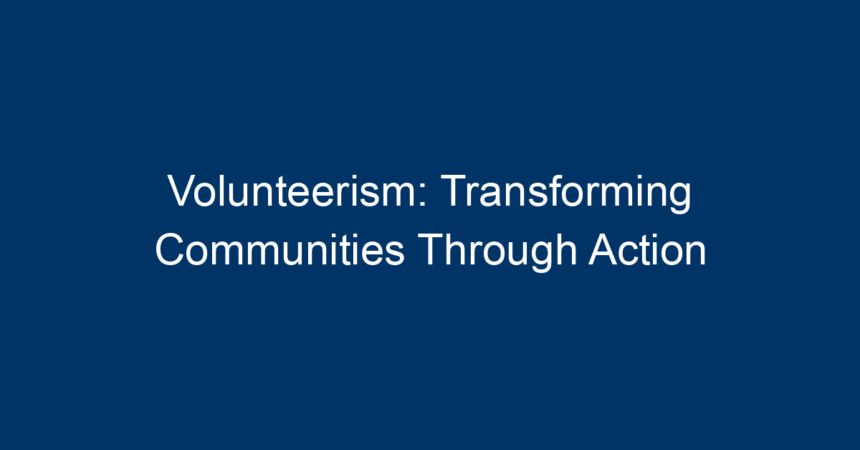Volunteerism is more than just an act of kindness; it is a transformative force that can reshape communities and uplift lives. As individuals dedicate their time and resources to support a cause, they foster connections, inspire change, and create a ripple effect that transcends boundaries. In this article, we will explore the significance of volunteerism, its benefits, and how it serves as a catalyst for community development.
The Essence of Volunteerism
What is Volunteerism?
Volunteerism refers to the intentional act of providing time and skills to benefit others without expecting financial compensation. This selfless dedication can take many forms, from helping at local shelters to mentoring youth or participating in community clean-up efforts. At its core, volunteerism seeks to address gaps where assistance is needed, enhancing social ties and fortifying community bonds.
Historical Perspective
Historically, volunteerism has roots in various cultures and societies. From ancient tribal communities who relied on collective effort to sustain their livelihoods to modern movements advocating for social justice, the spirit of volunteering has always been integral to human existence. In the face of adversity, such as natural disasters or economic downturns, communities often turn to volunteers for support, demonstrating the timeless power of altruism.
The Impact of Volunteerism on Communities
Building Stronger Relationships
One of the most profound impacts of volunteerism is its ability to forge connections. Volunteers often collaborate with diverse groups, building friendships and breaking down barriers. When people unite for a common cause, they celebrate shared goals, foster mutual respect, and promote understanding among different cultures and socioeconomic backgrounds.
Empowering Individuals
Volunteerism empowers individuals by providing them with opportunities to develop new skills, gain experience, and enhance their confidence. Whether one is leading a community project or participating in a group effort, volunteers acquire valuable life skills, teamwork, and leadership that translate into personal and professional growth. For many, volunteering can be a pathway to new opportunities and experiences.
Addressing Community Needs
Communities often face pressing issues such as poverty, homelessness, and environmental challenges. Volunteerism is critical in addressing these needs, allowing local organizations to extend their reach and effectiveness. Volunteers play pivotal roles in organizing food drives, educational programs, and health initiatives, providing services that might otherwise be unattainable for vulnerable populations.
The Benefits of Volunteerism
For Individuals
Volunteering offers numerous benefits for those who choose to engage. Here are some of the most notable advantages:
-
Personal Growth: As individuals immerse themselves in volunteer activities, they often discover new passions and interests, leading to a deeper understanding of themselves.
-
Mental Health Improvement: Engaging in volunteer work has been linked to reduced stress levels, increased happiness, and the combatting of loneliness. Helping others creates a sense of purpose and fulfillment, vital for mental well-being.
- Networking Opportunities: Volunteering opens doors to new social circles, allowing individuals to meet people from various walks of life, which can lead to friendships and career advancements.
For Communities
The collective impact of volunteerism fosters thriving, resilient communities. Benefits include:
-
Enhanced Community Cohesion: When people come together for a common cause, they create a stronger social fabric. This connectedness is vital for community resilience and collaboration.
-
Resource Mobilization: Volunteers bring different skills and resources to address community challenges, ultimately leading to improved services and initiatives.
- Economic Influence: Volunteerism can have a positive economic impact by attracting investment to the community, boosting local businesses, and creating jobs through nonprofit initiatives.
Volunteerism in the Digital Age
The Role of Technology
In today’s world, technology has transformed the landscape of volunteerism. Social media platforms, websites, and apps connect volunteers with organizations in need, making it easier than ever to get involved. Virtual volunteering also allows individuals to contribute from the comfort of their homes, breaking geographical barriers.
Online Volunteerism
Online volunteerism has gained significant traction, especially post-pandemic. From providing mentorship through virtual sessions to assisting with digital marketing for non-profits, there are many ways to contribute remotely. This adaptability is crucial for engaging a diverse range of volunteers and leveraging their unique skills.
Getting Involved: How to Start Volunteering
Identify Your Interests
Before diving into volunteerism, consider what causes resonate with you. Whether it’s animal welfare, environmental conservation, or social justice, identifying your passion will make your volunteer experience more meaningful and enjoyable.
Research Local Organizations
Once you know your interests, research local organizations that align with them. Many nonprofits and community groups constantly seek volunteers and have various roles available. Pay attention to their mission, vision, and the specific needs they are trying to address.
Commit to Regular Engagement
While even a single act of kindness can have a lasting impact, committing to regular volunteerism amplifies its benefits. Establish a schedule that allows you to balance your work and life while dedicating time to volunteer activities.
Spread the Word
Encouraging others to join you on your volunteering journey can multiply the impact. Share your experiences on social media or through community events to inspire friends, family, and colleagues to engage in volunteerism.
The Future of Volunteerism
As we move forward in an increasingly interconnected world, the role of volunteerism will remain pivotal. Addressing challenges like climate change, inequality, and public health crises will require collaborative efforts fueled by volunteers. Emphasizing diversity, inclusivity, and effective communication will enhance the volunteer experience and its effectiveness.
Creating Sustainable Impact
To ensure the future effectiveness of volunteerism, it’s essential to focus on sustainable practices. Organizations should prioritize volunteer care and retention by providing training, resources, and recognition. Encouraging feedback from volunteers can also lead to improvements in programs and initiatives, maximizing their impact.
Conclusion: The Call to Action
In conclusion, volunteerism is a vibrant and essential aspect of community life. It holds the potential to reshape not only individuals but entire communities, creating a better world for us all. By contributing time and skills, each person can make a difference, whether it’s local or global.
Take the initiative today. Reflect on your passions, research organizations in your community, and find a way to get involved. Volunteerism is not just an act; it’s a movement—a transformative action that can drive societal change and foster a kinder, more unified world. Join the ranks of those who believe in the power of action, and together, let’s pave the way for a brighter future through volunteerism.




